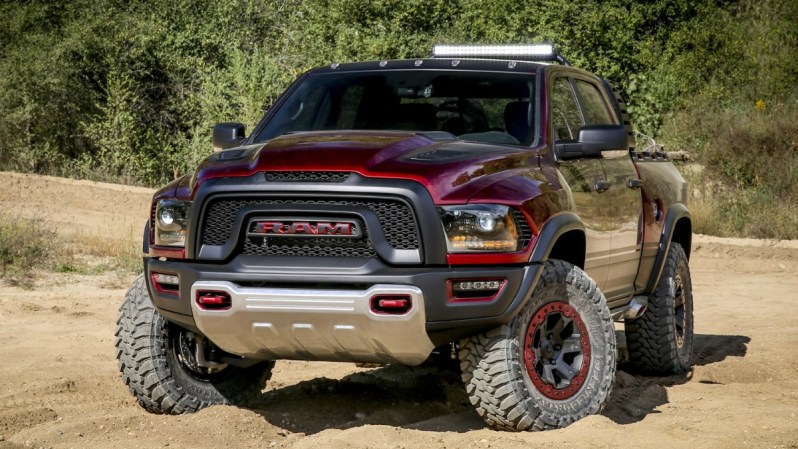
The off-road vehicle scene is booming. Ford’s second-generation Raptor is flying off dealer lots, Jeep is basically bankrolling its parent company (FCA), and GM keeps adding off-road trims to its various pickup lines.
It comes as no surprise, then, that Ram wants in on the action. Though the truck-maker currently offers a light-duty off-road version of its Ram 1500 pickup, the Rebel, there’s plenty of room for improvement. During FCA’s five-year plan presentation this week, Ram boss Mike Manley confirmed a more aggressive pickup is coming soon.
The Rebel TRX (or “T-Rex”) will be based on the all-new Ram 1500 and will go head-to-head with Ford’s Raptor. Inspired by the Rebel TRX Concept that debuted in 2016, the production model will gain extra skid plates, massive knobby off-road tires, auxiliary lighting, and a beefier suspension setup. Specific details are light, but we anticipate the TRX will use a version of the 6.2-liter supercharged V8 found in the Hellcat and Trackhawk, which means upwards of 700 horsepower. The Raptor and its 450-hp twin-turbocharged V6 is starting to sound a little outclassed.
We’ve had a go in both the standard Ram Rebel and the Ford Raptor, taking each truck on its own adventure. While it was clear the Raptor was more capable, we loved the Rebel’s ride quality and creature comforts. As long as the new Rebel TRX retains its docile driving dynamics in its pursuit of off-road prowess, we’ll be happy.
Given the extensive modifications in store for the TRX, don’t expect it to be cheap. Based on other range-topping FCA products, the starting figure could be in the $60-70K range. The Ram Rebel, by comparison, starts at just $46,340 and Ford’s Raptor kicks off at $49,520. FCA hasn’t announced when the truck will go on sale, but 2019 seems like a good guess. After all, Ram doesn’t want to miss this off-road craze.
During the same five-year presentation, FCA’s top brass also confirmed a 600-horsepower hybrid Alfa Romeo sedan, all-electric Maserati sports car, and several three-row Jeeps. Notably absent was any future Chrysler product, suggesting FCA might be readying to dump the brand altogether.
If this bit of news doesn’t grease your gears, check out the top five revelations from this year’s Detroit Motor Show.


